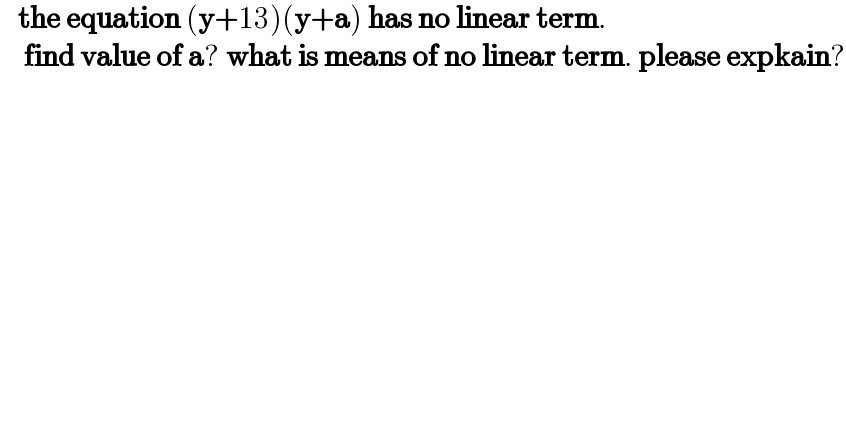
Question Number 151377 by zakirullah last updated on 20/Aug/21

$$\:\:\:\boldsymbol{\mathrm{the}}\:\boldsymbol{\mathrm{equation}}\:\left(\boldsymbol{\mathrm{y}}+\mathrm{13}\right)\left(\boldsymbol{\mathrm{y}}+\boldsymbol{\mathrm{a}}\right)\:\boldsymbol{\mathrm{has}}\:\boldsymbol{\mathrm{no}}\:\boldsymbol{\mathrm{linear}}\:\boldsymbol{\mathrm{term}}.\: \\ $$$$\:\:\:\:\boldsymbol{\mathrm{find}}\:\boldsymbol{\mathrm{value}}\:\boldsymbol{\mathrm{of}}\:\boldsymbol{\mathrm{a}}?\:\boldsymbol{\mathrm{what}}\:\boldsymbol{\mathrm{is}}\:\boldsymbol{\mathrm{means}}\:\boldsymbol{\mathrm{of}}\:\boldsymbol{\mathrm{no}}\:\boldsymbol{\mathrm{linear}}\:\boldsymbol{\mathrm{term}}.\:\boldsymbol{\mathrm{please}}\:\boldsymbol{\mathrm{expkain}}? \\ $$$$ \\ $$
Commented by mr W last updated on 20/Aug/21

$${example}: \\ $$$${in}\:{ax}^{\mathrm{3}} +{bx}^{\mathrm{2}} +{cx}+{d} \\ $$$${d}\:{is}\:{the}\:{independent}\:{term}\:\left({constant}\right). \\ $$$${cx}\:{is}\:{the}\:{linear}\:{term}. \\ $$$${no}\:{linear}\:{term}\:{means}\:{c}=\mathrm{0}. \\ $$
Commented by zakirullah last updated on 20/Aug/21

$$\boldsymbol{{thank}}\:\boldsymbol{{you}}\:\boldsymbol{{so}}\:\boldsymbol{{much}}\:\boldsymbol{{dear}}\:\boldsymbol{{Sir}}! \\ $$
